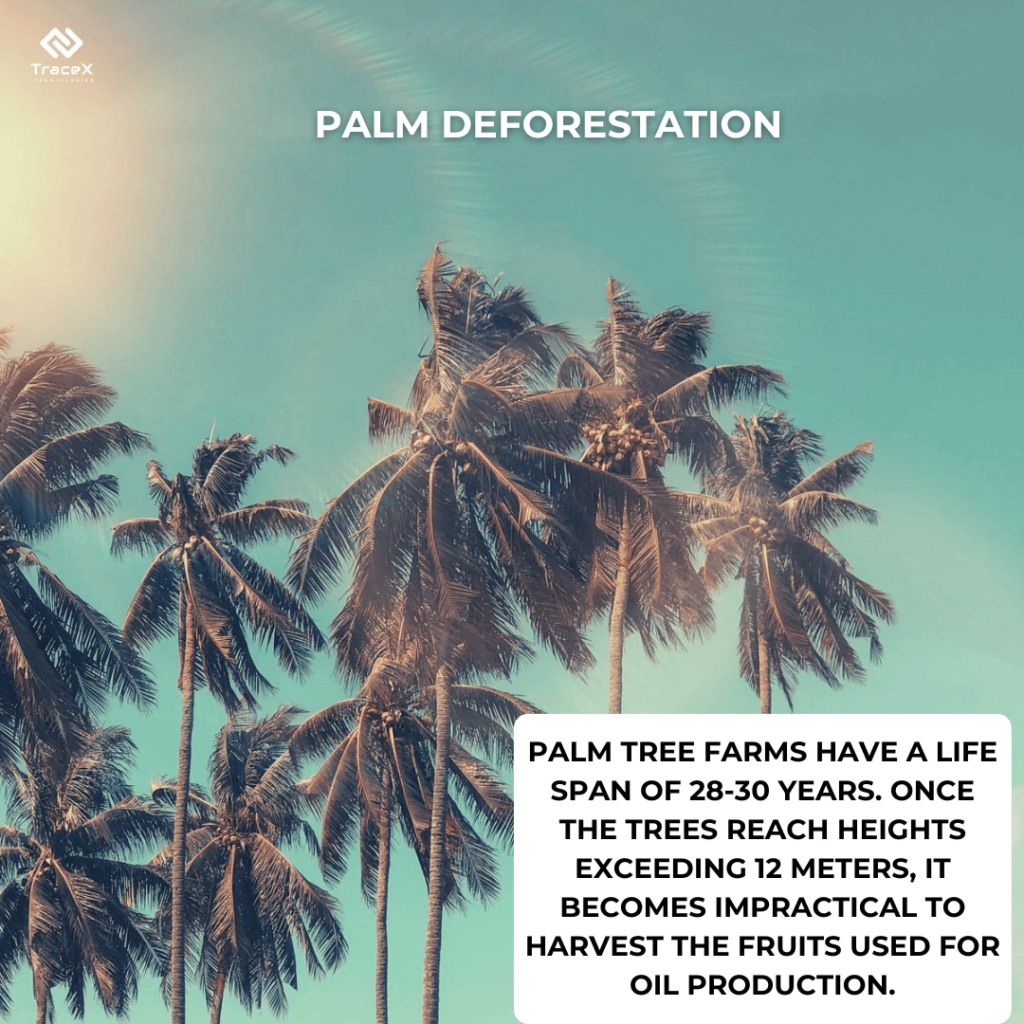Contact: +91 99725 24322 |
Menu
Menu
Quick summary: Learn how to achieve EUDR Palm oil compliance with traceability, DDS filings, and digital solutions for exporters, mills, and smallholders.

EUDR Palm oil compliance requires full supply chain traceability down to the plantation plot. Exporters, mills, and smallholders must provide polygon geolocation, prove no deforestation after 31 December 2020, and submit a Due Diligence Statement (DDS) in the EU TRACES system. Certifications like RSPO or ISCC may support risk mitigation, but do not replace DDS filings. Special attention is needed for Fresh Fruit Bunch (FFB) agents, who aggregate fruit from smallholders and often break traceability. Digital platforms such as TraceX streamline geolocation, risk assessment, supplier onboarding, and TRACES submissions for audit-ready EUDR Palm oil compliance.
The EU is one of the largest global importers of palm oil, using it in food, cosmetics, biofuels, and industrial applications. Because palm oil cultivation has historically been linked to large-scale deforestation in Southeast Asia and increasingly in Africa, it is directly targeted under the EU Deforestation Regulation (EUDR).
For palm oil exporters, this means strict new compliance rules: every shipment must be backed by geolocation data down to the plantation plot, legality verification, and a Due Diligence Statement (DDS) filed in TRACES.
The risk of non-compliance is severe: rejected consignments, financial penalties, and loss of EU market access. For companies dependent on Europe as a buyer, EUDR palm oil compliance is now business-critical.
Key Takeaways
In recent years, the palm oil industry has faced a multitude of challenges due to its environmental impact. As one of the most widely used vegetable oils globally, palm oil is found in everything from food products to cosmetics. However, its production has been closely linked to deforestation, biodiversity loss, and carbon emissions, particularly in Southeast Asia. This has raised alarms for regulators, consumers, and environmental activists alike.
Palm oil is a major commodity in global trade, accounting for 35% of the world’s vegetable oil production.
Its versatility makes it an essential ingredient in a wide range of products, including:

Retailers recognize that this is increasingly influencing consumer decisions. From shampoos to laundry soaps and from chocolates to biscuits, brands are working to remove palm oil from their offerings.
Despite its prevalence, palm oil has earned a negative reputation due to its role in deforestation, particularly in Southeast Asia, where vast tracts of tropical forests have been cleared for palm plantations.
As the two largest producers of palm oil, accounting for 85% of the world’s palm oil production, Indonesia and Malaysia are significantly affected by the EUDR. These countries account for a substantial portion of the world’s palm oil and biodiesel production.
According to Global Forest Watch, palm oil production is responsible for 23% of deforestation in Southeast Asia alone.
Given the scale of the problem, the EUDR represents a much-needed shift towards sustainability. But how can businesses ensure that their palm oil supply chains meet these stringent standards?
Struggling with EUDR readiness?
Dive deeper into our blog on EUDR compliance and learn how to stay audit-proof.
Want to master due diligence under EUDR?
Read our guide on building a compliant DDS step by step.
Unlike past sustainability initiatives, the EUDR is not about broad pledges or certification logos — it’s about evidence.
Schemes like RSPO or ISCC remain valuable, but they are risk-mitigation tools, not substitutes for EUDR compliance. Here’s why:
The EUDR is forcing a mindset shift: compliance is no longer about trust in labels, it’s about proof in data. Certifications can open the door, but polygons and DDS filings are what let your shipment pass through it.
This is where technology changes the game. A platform like TraceX turns these barriers into building blocks, digitizing farmer data, validating polygons, capturing FFB transactions, and automating DDS filings, so exporters stay compliant while smallholders stay included.
Roughly 40% of the world’s palm oil is grown by smallholder farmers cultivating a few hectares each, often with limited resources and little exposure to digital tools. They are critical to the industry, but also the most vulnerable under the EU Deforestation Regulation (EUDR).
Because smallholders usually don’t sell directly to mills, their harvest flows through Fresh Fruit Bunch (FFB) agents, informal aggregators who collect fruit from dozens or even hundreds of farmers. This is where the risk emerges:
The result? By the time FFBs reach the mill, the traceability chain has already collapsed. Even if exporters want to file a Due Diligence Statement (DDS), they lack the farm-level evidence required.
The success of EUDR compliance in palm oil doesn’t depend on the biggest mills or exporters — it depends on whether we can digitally onboard FFB agents and connect them to smallholders. Without them, the chain of custody is incomplete, and the EU market is at risk.
Platforms from TraceX solve this last-mile problem by digitizing FFB transactions, mapping them to verified smallholder plots, and ensuring the chain of custody remains intact all the way to EU filing.
The RSPO is an international coalition aimed at ensuring sustainable palm oil production. The efforts of the RSPO align well with the objectives of the EUDR, both focused on halting deforestation. For this reason, the RSPO has backed the EUDR concept since it began. At the same time, the RSPO acknowledges potential adverse consequences of the regulation, including the risk of independent smallholder farmers being sidelined from the European market and the creation of alternative supply chains.
One of the key solutions to this challenge is digital farmer engagement platforms that help smallholder farmers adopt sustainable practices and track their progress. Through mobile apps and cloud-based platforms, farmers can receive training, access to financing, and real-time data on their environmental impact. This not only helps them meet EUDR standards but also improves their productivity and livelihoods.
While complying with EUDR may seem like an additional burden for businesses, it also offers substantial economic benefits. By aligning with sustainability standards, companies can unlock new market opportunities, particularly in Europe, where consumers are increasingly demanding eco-friendly products.
Additionally, adopting sustainable palm oil practices can lead to long-term savings by reducing environmental damage and improving soil health. Companies that lead in sustainability are also better positioned to attract investment and form strategic partnerships with NGOs and government bodies focused on environmental conservation.

EUDR compliance is complex because it spans multiple players — farmers, FFB agents, mills, exporters, and EU importers. Manual systems can’t keep up. This is where digital platforms like the EUDR Compliance platform from TraceX transform the process:
See how a Nigerian trading firm turned EUDR challenges into compliance success with TraceX.
In an era of scrutiny, trust comes from evidence — not promises.
With TraceX, palm oil exporters and importers don’t just stay compliant — they stay competitive. Compliance becomes a growth driver, opening access to EU buyers who demand deforestation-free supply chains.
EUDR Palm oil compliance is not just about avoiding penalties; it’s about building trust, ensuring market access, and securing the livelihoods of smallholders. By investing in traceability, digitizing supply chains, and onboarding FFB agents, exporters can transform compliance into an opportunity. With digital platforms like TraceX, achieving audit-proof DDS filings and EU market readiness becomes faster, easier, and more reliable.
Don’t let bad polygons block your shipment.
Read our blog on common GeoJSON errors and how to fix them before filing.
Confused about DDS filing?
Our step-by-step blog shows you exactly how to submit EUDR DDS in TRACES
Traceability starts at the farm gate.
Read how to onboard smallholder suppliers into your EUDR workflow.
EUDR requires geolocation polygons of plantations, proof of no deforestation after Dec 31, 2020, and a Due Diligence Statement (DDS) filed in TRACES.
No. Certifications can support risk mitigation, but they do not replace the legal requirements of geolocation data, risk assessments, and DDS filings.
By using digital tools to capture farm polygons, link deliveries to farmers, and integrate data with DDS systems, traceability can be achieved from farm to port.
